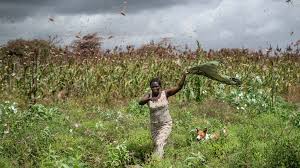The United Nations has called for more funding to help fight huge swarms of desert locusts sweeping through East Africa.
The locust upsurge is “a graphic and shocking reminder” of the region’s vulnerability, said on Wednesday a joint statement from Qu Dongyu, Director-General of the Food and Agriculture Organization (FAO) Mark Lowcock, UN Emergency Relief Coordinator; and David Beasley, Executive Director of the World Food Programme (WFP)
“This is a scourge of biblical proportions”, the statement read.
“Yet as ancient as this scourge is, its scale today is unprecedented in modern times”, it said.
Although the UN agriculture agency sounded the alarm in January, calling for financial assistance to control the outbreak, resources have been too slow in coming.
Since FAO launched its first appeal to help what was at the time three affected countries, the locust swarms have moved rapidly across vast distances and as of 12 February, have been sighted in Ethiopia, Djibouti, Eritrea, South Sudan, Uganda and Tanzania.
Each day, more countries are affected, the statement said.
Last week, a swarm crossed into South Sudan, one of Africa’s most food-insecure and fragile countries.
And just this week, one swarm reached the eastern boundaries of the Democratic Republic of the Congo – a country that has not seen a locust incursion since 1944.
The potential impact of locusts on a country that is still grappling with complex conflict, displacement, Ebola and measles outbreaks and food insecurity would be devastating.
As the locusts continue their invasion throughout eastern Africa, and more details emerge on the scale of need in affected areas, the cost of action has shot up to $138 million to support governments in controlling the ravaging pests, especially over the next four months.
MG/as/APA


